Honoring Mendez, et al v. Westminster at the Los Angeles U.S. Courthouse
In celebration of civil rights trailblazers and during Hispanic Heritage Month 2023, Congressman Jimmy Gomez introduced H.R. 5754, a bill to name the Los Angeles U.S. Courthouse in honor of Felicitas and Gonzalo Mendez, who along with the Guzman, Palomino, Estrada and Ramirez families challenged segregation in California schools and set the stage for school desegregation nationwide. Their landmark 1946 case led to the end of segregation in California schools and paved the way for Brown v. Board of Education. The LA federal courthouse sits just blocks from where the historic Mendez case was originally decided and would be the first courthouse named after a Latina.
 |
| Sylvia Mendez, one of Gonzalo and Felicitas’s children who was turned away from her local school because of her ethnicity. |
Five Families’ Fight for Equal Rights
Felicitas and Gonzalo Mendez
 |
| Felicitas and Gonzalo Mendez Sr. |
After their children Sylvia, Gonzalo Jr. and Jerome were rejected from attending a whites-only school because of their Mexican appearance and ancestry, Felicitas and Gonzalo Mendez joined with the Ramirez, Estrada, Guzman and Palomino families to challenge segregation through the landmark case Mendez, et al vs. Westminster School District of Orange County, et al. The families won their case in 1946, leading California to enact a law that made it the first state to officially desegregate its public schools. That law was signed by Governor Earl Warren, who just seven years later wrote the opinion of the Supreme Court as Chief Justice in Brown v. Board of Education, ending school segregation nationwide.
Lorenzo and Josefina Ramirez
 |
| From left, Lorenzo, Ignacio, Josefina and Jim Ramirez. This photograph was taken in the 1940s. |
 |
| Ignacio, Silverio, and Jose Ramirez Boys |
Lorenzo and Josefina Ramirez and their children were honored by the Orange Unified School District in a proclamation in 2011:
Lorenzo Ramirez spent part of his youth living in El Modena and graduated from Lincoln Grammar School in 1927, moving back to El Modena with his wife Josefina Ramirez in 1944 to raise their children. Lorenzo and Josefina Ramirez tried to enroll their three oldest children, Ignacio, Jimmy, and Jose, in Roosevelt Grammar School, only to be told that the children would have to attend Lincoln Grammar School, which had become a segregated Mexican school.
Lorenzo and Josefina Ramirez decided to defend all children’s rights to an equal public education lawsuit education by uniting with four other families in Orange County as plaintiffs in a class action lawsuit known as Mendez et al v. Westminster School District et al. Lorenzo Ramirez, when called to testify, shared his conviction that all children should be educated together and, furthermore, expressed how grateful he was to live in a country that stood for the principle of equality.
In 2014, Rancho Santiago Community College District (RSCCD) named the Santiago Canyon College library in honor of Lorenzo A. Ramirez.
Virginia and William Guzman
 |
| William and Virginia Guzman |
In 2019, the Rancho Santiago Community College District recognized the William and Virginia Guzman family of Santa Ana, noting:
The family was first to file suit challenging school segregation in Orange County in the 1940s. Although the Guzmans’ initial suit against the Santa Ana School District was unsuccessful, the family ultimately banded together with other families in the Westminster, El Modena and Garden Grove School Districts of Orange County to file and win the historic class action lawsuit Mendez et al v. Westminster et al in 1946.
According to the testimonio of the Guzmans’ daughter, Beverly, William Guzman worked for Consolidated Air in San Diego during World War II, while the family remained in Santa Ana. Their son, Billy, then entered kindergarten at Fremont Elementary School in Santa Ana in 1942. At the time, Fremont Elementary was the designated school for Mexican students while a neighboring school, Franklin Elementary, served white students. Virginia, Billy’s mom, wanted her son to attend Franklin Elementary as it was closer to their home and had newer textbooks and better facilities. The Guzmans tried to enroll Billy in Franklin Elementary in 1943 but were denied by the principal based on a policy of the school board to have separate schools for Mexican students. Not wanting their son to endure the unjust experience of attending a segregated school, the Guzmans worked to drum up support with their neighbors and the Mexican community in Santa Ana for the case that became Mendez et al v. Westminster et al.
Tomas and Mary Luisa Estrada
 |
| Estrada Children: Clara, Syria, Roberto, Evelina, Daniel, Francisco Estrada (R-L) |
Tomas Estrada was born in Sinaloa, Mexico and married his wife Mary Luisa in 1929 after relocating to the United States, according to the Estrada family. Tomas worked as an air raid warden and water supply driver during World War II while Mary Luisa worked for a short period in a factory riveting airplanes. Together they raised six children: Clara, Roberto, Francisco, Sylvia, Daniel and Evelina. They joined with the four other families to sue to bring an end to segregation in California schools, and worked to gather support for the lawsuit from their local community in Westminster.
Frank and Irene Palomino
 |
| Frank and Arthur (son) Palomino. |
 |
| Arthur Palomino in the 1st Grade |
According to the Palomino family papers at Chapman University, Frank and Irene Palomino lived in Santa Ana and resided in the Garden Grove School District at the time Frank served as one of the plaintiffs in Mendez v. Westminster. Their son, Arturo, also known as Arthur, was eleven years old during the trial. Frank went to one of the Garden Grove schools to ask the superintendent if he could enroll his children, Arthur and Sally. The superintendent told Frank that his children were of Mexican descent and were not allowed there. The superintendent told him he had to enroll them at the Hoover School, which was for children of Mexican descent. Frank decided to instead enroll them at integrated schools elsewhere. Frank testified to these facts as one of the plaintiffs in Mendez v. Westminster.
Mendez v. Westminster and the families involved have been commemorated through numerous awards, recognitions and public facilities, including:
-
A stamp issued by the United States Postal Service in 2007, commemorating Mendez v. Westminster.
-
The Presidential Medal of Freedom awarded to Sylvia Mendez at a 2011 White House ceremony.
-
Multiple schools across the country named after the Mendez Family, from Los Angeles, Santa Ana, and Berkeley in California to Dallas, TX and High Point, NC.
-
The Mendez Historic Freedom Trail and Monument, which opened on December 1, 2022, in Westminster, California.
-
A proclamation by the Orange Unified School District honoring Lorenzo and Josefina Ramirez and their children in 2011.
-
The Rancho Santiago Community College District (RSCCD) Santiago Canyon College library, named in honor of Lorenzo A. Ramirez. The school also recognized the William and Virginia Guzman family of Santa Ana.
-
The El Modena High School library, named in honor of Lorenzo A. Ramirez in 2012.
Our public institutions should reflect the rich diversity that is the history and strength of our nation. However, of the over 200 named United States courthouses across the country, only 20 are named for people of color and 6 named in honor of a woman. The Felicitas and Gonzalo Mendez U.S. Courthouse would be the first to be named for a Latina and only the eighth commemorated in honor of Hispanic Americans.
The Los Angeles U.S. Court House:
Rep. Gomez’s legislation would designate what is now the Los Angeles U.S. Courthouse as the Felicitas and Gonzalo Mendez U.S. Courthouse. The Courthouse opened in 2016 at 350 W. 1st Street, Los Angeles, CA 90012, just blocks from the historic Spring Street Courthouse where the original Mendez v. Westminster case was decided. The Spring Street Courthouse is now listed on the National Register of Historic Places and no longer functions as a federal courthouse.
Bipartisan Support for Honoring the Mendez Legacy:
This bill to name the Los Angeles U.S. Courthouse in honor of Felicitas and Gonzalo Mendez has bipartisan support from over 60 members of Congress from across our country. The bill passed the House of Representatives unanimously on May 21, 2024, and now awaits Senate consideration.
The NAACP and Japanese American Citizens League, who filed amicus curiae briefs in support of the families in the original case, wrote letters of support for Rep. Gomez’s legislation to memorialize the Mendez family. The following 21 Latino civil rights and advocacy organizations also submitted a letter of support:
Association of Latino Administrators and Superintendents (ALAS)
Esperanza United (formerly Casa de Esperanza: National Latin@ Network)
Hispanic Association of Colleges and Universities (HACU)
Hispanic National Bar Association
Labor Council for Latin American Advancement
League of United Latin American Citizens (LULAC)
MANA, A National Latina Organization
Mexican American Legal Defense and Educational Fund (MALDEF)
Migrant Legal Action Program
National Hispanic Media Coalition
National Hispanic Medical Association
National Latinx Psychological Association
National Migrant and Seasonal Head Start Association
The National HEP/CAMP Association